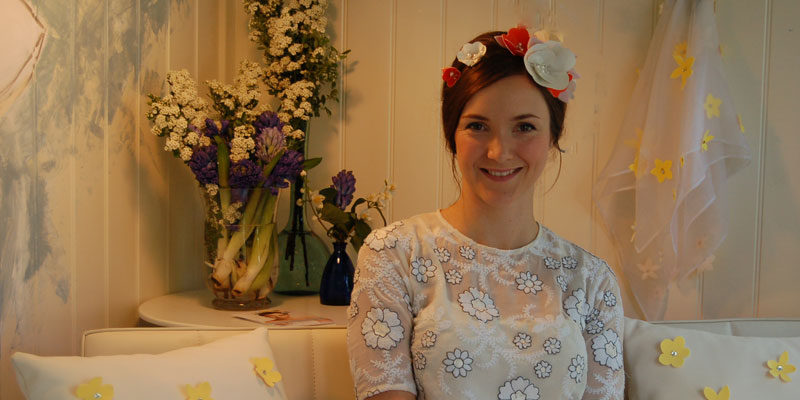Lizzie McQuade is a London-based, Scottish milliner who creates hats and head-pieces utilising her skills in traditional millinery, embroidery, latex and leather-work beading and hand-dying techniques. Lizzie frequently works on commissioned pieces for clients such as Vogue, Vogue Italia, Dazed & Confused, Whistles, Partimi and Felder Felder. In 2013 Lizzie became the winner of the inaugural Triumph ‘Women in Making’ competition and sat on the 2014 judging panel. She designed an Artisan Retreat for RHS Chelsea 2014 titled “I haven’t had tomorrow yet…”, inspired by Elizabeth Taylor’s love of diamonds, flowers and finery.
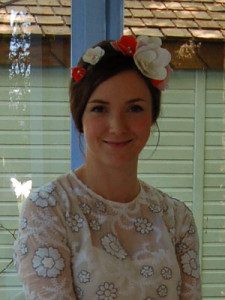
You’ve tried a few different roles in fashion before you discovered your passion for millinery. Why was this?
It was quite a surprise to me that I came to a point where I didn’t know what I wanted to do because I decided I wanted to be a fashion designer when I was about ten. I just didn’t listen to anyone who said, “Shouldn’t you do something more academic?”
I went to art college, studied fashion, finished and went to work for a designer called Emma Cook, which was a fantastic experience, but what I decided at the end of my three years there was I didn’t want to run my own womenswear label because it’s actually a really big undertaking; you’ve got so many overheads – the logistics behind it are so much bigger than an accessories business.
You need a pattern cutter and a much bigger studio, whereas it’s not really something you could do on your own, so you need more capital to begin with.
I’d also been doing projects for other stylists and I’d been asked to make styling pieces. I found that the accessories were more enjoyable to me. So off the back of that I left Emma Cook and went freelance. I just wanted to build on my experience while I decided what exact area I was going to be working in. And I think the experience has really paid off. It’s given me a really great base for building my business up.
So that’s how it happened. It was a bit of a surprise when I didn’t just go, “I’m going to go and start my own womenswear label,” but I found what I wanted to do through trying lots of different things.
The fashion industry is notoriously competitive – how did you manage to differentiate yourself and your work?
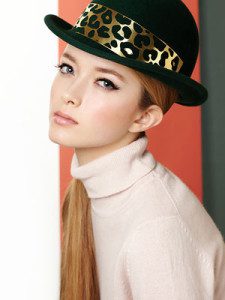
Things were very graphic and directional or were quite masculine edged and those were the things that got lorded and held up as being high fashion. I think my natural aesthetic is quite girly, as you can see from my work. I tried at first to fight against that and it was only when I stopped doing that and decided I’d rather enjoy doing my work that people started picking up on it.
I think having spoken with Roksanda Ilincic, who’s one of my mentors for the Triumph Women in Making competition, she said, “Stay true to your own ideas and then you produce better work and people notice it.” I think that’s it. If you’re good at what you do, staying true to your style is the best thing you can do.
Trying to adapt myself didn’t work and as soon as I said “no, I’m going to do what I want,” things just started happening. I loved my work more, I could talk about it better to people and people really respond to that. People can tell it’s genuine and they’re excited about that. It’s easier to get involved and talk to them about the work when it’s really what they want you to produce.
What you do is a balance between the creativity and business. How important is it for you to be around like minded creative people?
It’s really important for me. I love collaborating with other creatives. I’m really keen to establish a collaboration with print designers or I know a couple of jewellers who could make pieces that I could incorporate into my millinery.
I wouldn’t want to be in a studio by myself really unless I had a big team around me by that point. I share with a set designer called Emily Pugh at the moment, who’s one of my oldest friends, so that’s really fun.
You need someone there who also has a creative mind. Sometimes you get stuck or you’d just not sure or I might be doing something and thinking it’s great and Emily will come over and say, “Hmmm. Maybe try this.” You do need that extra set of eyes and someone you can turn to and bounce ideas off.
I think you can get a bit stuck in your own head as a creative. You create this vision and you’re sketching it out. You can get quite caught up in it, especially in millinery, so it is important to have a break and chat to other people to talk about your work and share ideas.
What’s the best way to develop the skills you need to run your own business alongside your millinery skills?
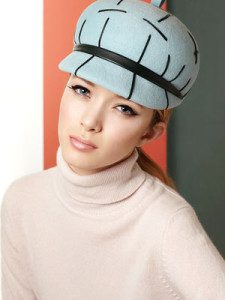
In London in particular there’s the East London Small Business Centre, who can offer advice on getting loans, for example. I’m particularly excited to now be working with the British Fashion Council. They’ve got a wealth of experience and people who can give you advice on sales, on your finances, on every single aspect of a business model.
You learn as you go along. I got an accountant a few years ago, which was the best thing I ever did! She’s great. She talks me through things and she’s brought up things I can change and apply for along the way that will help me with my business.
So I think just reach out to the people who are experts. I read a great piece of advice in Stylist Magazine a few years back that just said in business, if something is not your area of expertise, don’t spend days and days trying to do it yourself. You’re wasting your time and your money. Pay someone.
It might feel like an expense because you’re having to pay, but at the end of the day you’re saving yourself so much time and money, you know it’s done right, then your time is free for developing your designs, which is the part that you’re good at and the reason why you started your business.
You are certainly just learning along the way; there will be ups and downs, there’ll be knocks, but I think if you just take a lesson from everything then every single thing that happens is worth it as long as you’re progressing.
There’s always something new. Businesses get bigger and bigger and as that happens there’s new things you didn’t know about before, that didn’t apply to you before. Maybe no-one told you about them and all of a sudden it’s something to consider, like VAT. I think just seek out the people who you feel understand you and your business and who can offer you advice.
You took your inspiration from the glamour of Elizabeth Taylor for your SS14 collection. What is it you like most about her?
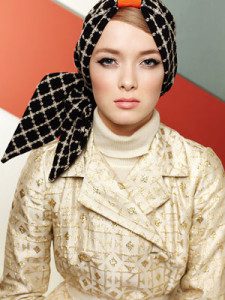
That was Elizabeth Taylor’s character, and she became the inspiration for the collection. I love that she was an incredibly strong, outspoken and fearless woman, but so feminine and girly in her aesthetic and absolutely unabashed in it. I looked at her and thought, “That’s an example of what I’d like to be. Just truly yourself and unapologetic about it, with an appreciation for beautiful things.”
She seemed to strike a balance between being strong and glamorous. Sometimes I think there’s a perception that if a woman’s very feminine and dressed up, does her hair and her make-up that she’s not a serious person, she’s not maybe as intelligent, or as proactive in campaigning or in business.
Elizabeth Taylor really started to change people’s perceptions. She did so much campaigning, she co-founded the American Foundation for AIDs Research (amfAR) and she did all of this when people were telling her not to. She’s quite an inspiration really.
Congratulations on your recent marriage! How important is it to have the support of a life partner whilst you’re developing your career?
For me personally I wouldn’t be here doing this without him. From the beginning he saw that I had a talent and perhaps I wasn’t the most confident in my own talent when we first met.
He’s someone with bags of confidence because he works in PR, so he’s very outgoing and outspoken and that’s not really my natural place, but I’ve really worked on it and all the way through he’s said, “Look, you need to believe in yourself. You can do this.”
He’s supported me. Given me tough talks when I needed a tough talk and been gentle and supportive when he needed to be.
Obviously when you’re starting a business and you’re freelance like I am cashflow’s a little bit scary at times and he’s been there to support that as well which I’m very lucky to have had.
When I have successes he’s as happy about it as I am. We can share in that moment of achieving something together because we really did achieve it together. I think that’s so important to have someone who really believes in what you do and in you as a person and can be there to prop you up when you’re maybe a little bit low. It’s very important.
All it can take is someone to say one thing and you can feel quite hurt by it. When you’re putting your work out there it’s very personal. It comes from me and when people make comments about it I feel like I do take it quite personally. So it’s good to have someone there to pick you back up.
What’s next for Lizzie McQuade?

So it’s onwards and upwards now. I will be putting energy into building my wholesale clients list. I’ve got a big private client base now, which is really nice. I do lots of bridal and lots of private commissions, so what I’d like now is to also see my work in some of the wonderful high end stores that I like to visit and the hat departments that I love so much.
So places like Fenwick Bond Street, Fortnum and Mason and little boutiques like Viola in London, as well as international stores. So that’s all to build on. I’ve worked a bit in sales during my time in fashion so I feel like a have a groundwork of knowledge there and now that I’ve developed my collections, they’re big enough and with the right range to start working with those stores.
For millinery London’s fantastic. You’ve got all the materials that you need on your doorstep. Some of the world’s best milliners live and work here like Stephen Jones, Phillip Treacy, Piers Atkinson (who I’ve worked a lot for) and Noel Stewart who taught me at Kensington and Chelsea College.
It’s amazing to be surrounded by those people and to have that little community here. Again that keeps you so inspired, just looking at other people’s work and seeing all that amazing things that are created around you. It feeds you and keeps you going.
http://www.lizziemcquade.co.uk/
https://twitter.com/lizzie_mcquade

